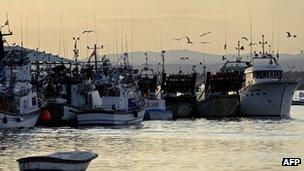EU overhauls regional aid policy
- Published

Spanish trawlers: EU aid helps to cushion the impact of globalisation on Europe's poorer regions
The EU is overhauling its controls to prevent waste in regional development projects - the biggest EU budget item.
In the past auditors have found many errors in the management of "cohesion" fund projects, which are intended to develop the EU's poorest regions.
The EU Commission plans to have formal contracts with national partners.
Pressure on budgets means cohesion spending is being hotly debated. Richer countries want cuts, but are opposed mainly by former communist countries.
The European Commission proposes a cohesion budget totalling 336bn euros (£275bn; $445bn) for the 2014-2020 period, compared with 354bn euros for the current period (2007-2013).
This week European affairs ministers from 13 countries, mostly in Central and Eastern Europe, urged the EU not to cut that budget any further.
But there were calls from net contributors to the EU's budget, including the UK, Germany and the Netherlands, for more cuts.
The EU's anti-fraud agency, Olaf, says that 1.6bn euros of cohesion funding was misspent in 2010 - the largest category of irregularities.
As part of the efficiency drive, the Commission and European Parliament have drafted a new financial regulation , externalto standardise the rules for disbursing EU funds.
The 27 member states' governments - called the Council - are demanding "a new impetus to the simplification process". They say the cohesion policy needs to be more user-friendly, avoiding duplication and excessive details.
Demand for clarity
The parliament's lead negotiator on the reforms, Dutch centre-right MEP Lambert van Nistelrooij, says that in the new spending period "there will be a contract with the national authorities - it will mention country-specific things, so that later those points are not misinterpreted".
"A minister's responsibility will be made clear at the start of the project," the Christian Democrat politician told the BBC.
He said some countries were failing to apply the EU's public procurement rules and the "error" rate was particularly high in Greece, Romania and Spain.
"In the internal market you have to give other countries' enterprises a chance to make a bid, for example in a road project," he said.
Last month the EU Commissioner for Regional Policy, Johannes Hahn, also complained that some countries had over-complicated procedures for selecting public sector contractors.
A Commission study showed that the Czech Republic "uses a very complex, lengthy and costly selection process" he said.
The Commission wants EU cohesion funding to focus on projects compatible with the Europe 2020 growth strategy, external, which aims to encourage business innovation and a low-carbon economy.
Mr Van Nistelrooij says that in the 2014-2020 funding period there will be a drive towards green energy projects, business start-ups and investment in the knowledge economy, with less emphasis on traditional infrastructure development.
"The old school of thinking for cohesion focused on developing the poorer regions... but Europe 2020 is EU-wide, smarter, greener," he said.
In the EU's 138bn-euro draft budget for 2013 , externalthe cohesion fund and related sustainable growth funding have the biggest slice - 62.5bn euros, compared with 57.9bn euros for agriculture, rural development and fisheries.
Plagued by errors
In a study of 40 cohesion fund programmes the European Court of Auditors (ECA) calls for the Commission to shorten the time taken to correct errors in project management.
It also recommends disseminating checklists so that national authorities apply best practice earlier on.
In 2009 the ECA found that more than 5% of cohesion payments were affected by high material error. That means misspending through bad accounting, but also, in some cases, deliberate fraud.
In a separate study of EU-funded port infrastructure projects the ECA found that only 11 of the 27 investments were effective.
Twelve of the projects had an average construction delay of 26 months, the report said. It covered projects funded in the 2000-2006 period.
- Published25 April 2012
- Published13 February 2014